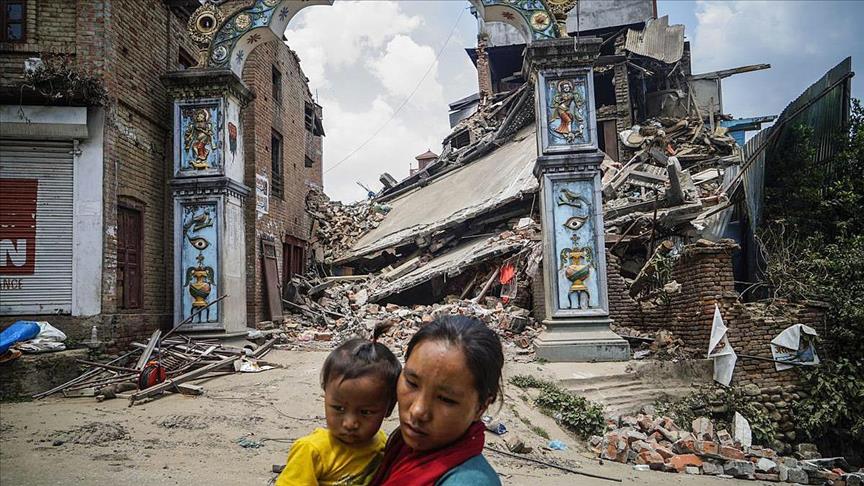Nepal’s post-quake rebuilding marred by political wrangling
Seven months on, reconstruction of homes and schools damaged by Nepal’s deadly earthquake has yet to begin

By Deepak Adhikari
KATHMANDU, Nepal
Earlier this year, Nepal was struck by a series of earthquakes and aftershocks, killing over 9,000 people, injuring more than 20,000 and damaging half a million homes and buildings.
Government officials and ministers swung into action and organized an international donor conference two months later, in which the international community pledged $4.4 billion for relief and reconstruction.
Even before the conference, the government had set up the National Reconstruction Authority to oversee the recovery efforts.
More than seven months on, however, reconstruction of homes and schools damaged by the quake is yet to begin.
Around 200,000 people in the central hill regions most affected by the quakes are still living in tents, according to a recent statement by UNICEF, the United Nations agency for children.
Laxmi Prasad Dhakal, spokesperson for the home ministry, said most of the earthquake-affected households have received the compensation of 15,000 Nepali rupees ($150).
“Almost all of the families who have lost their home have received it upon producing the required documents,” he told Anadolu Agency.
The monsoon season prevented many from building homes. Most farmers couldn’t plant paddy due to loss of seeds stored in their mud and stone homes, which were destroyed in the quake.
With harsh Himalayan winter only weeks away, Nepal is facing acute shortages of daily commodities due to an Indian blockade, exacerbating the woes of survivors.
The National Reconstruction Authority is in limbo due to wrangling among political parties.
Govinda Raj Pokharel was appointed CEO by the previous government, which also tabled a bill for approval in the parliament, but lawmakers failed to agree on its provisions, rendering the body invalid.
The ruling Unified Marxist-Leninist party wants to appoint its supporter as the CEO of the body. The opposition, Nepali Congress, wants to re-appoint Pokharel as CEO.
The Kathmandu Post, Nepal’s leading English daily, recently called the ruling party’s record “unedifying”.
“As part of the previous government, it deliberately delayed the passing of the Reconstruction Bill in parliament because it thought that it would be better able to control it if it was formed after the Unified Marxist Leninist came to power,” the newspaper said in its editorial. “Now, it is again caught up in power games over the new Authority. In the process, its leaders have demonstrated that they are callous towards the needs of earthquake survivors, who are now facing severe winter hardships.”
Rudra Pangeni, a journalist covering infrastructure for Republica newspaper, said the government hastened the inauguration of the body with the view of employing party cadres in plum posts.
“Both parties—the ruling and the opposition—are fighting for the top job so they can siphon off the aid meant for survivors,” Pangeni told Anadolu Agency. “Each party is saying that it will vote for the Reconstruction Bill only if its candidate is appointed as the CEO of the National Reconstruction authority.”
In July, Nepal’s National Planning Commission estimated the economic loss from the earthquake at around $7 billion, and the cost for reconstruction to be the same.
While the earthquake dealt a devastating blow to an already poor population dependent on subsistence farming, experts say the delay in reconstruction has pushed additional tens of thousands of people into poverty.
A quarter of Nepal’s 26 million population falls below the poverty line, meaning they earn less than a dollar a day, according to the Central Bureau of Statistics.
“What could have been transient poverty is turning out to be structural poverty due to delay in reconstruction works,” Basudeb Guha-Khasnobis, a senior economist with the United Nations Development Proagramme, was quoted as saying by Republica newspaper.
Nepal’s government and security forces were praised for their work in the aftermath of the disaster. But the authorities began to waver after the donors’ conference, according to experts familiar with reconstruction efforts.
“The authorities didn’t have a clear vision and strategy on the recovery efforts. From the very beginning, there was confusion on whether they were going to begin from scratch on infrastructure development or it was just reconstruction,” Surya Raj Acharya, an infrastructure expert, said. “If they had utilized funds pledged by donors in the six months after the earthquake, that would have set precedence and helped them attract more funds.”
For now, Nepal’s earthquake survivors, bracing themselves for the harsh winter season, can only hope that the slogan of “build back better” would one day become a reality.
Anadolu Agency website contains only a portion of the news stories offered to subscribers in the AA News Broadcasting System (HAS), and in summarized form. Please contact us for subscription options.

